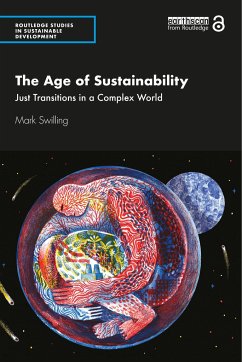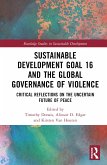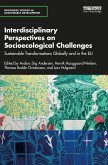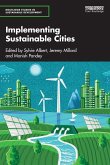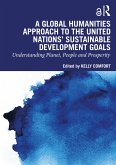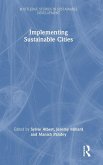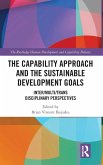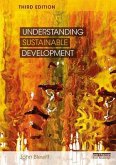With transitions to more sustainable ways of living already underway, this book examines how we understand the underlying dynamics of the transitions that are unfolding. Without this understanding, we enter the future in a state of informed bewilderment.
Every day we are bombarded by reports about ecosystem breakdown, social conflict, economic stagnation and a crisis of identity. There is mounting evidence that deeper transitions are underway that suggest we may be entering another period of great transformation equal in significance to the agricultural revolution some 13,000 years ago or the Industrial Revolution 250 years ago. This book helps readers make sense of our global crisis and the dynamics of transition that could result in a shift from the industrial epoch that we live in now to a more sustainable and equitable age. The global renewable energy transition that is already underway holds the key to the wider just transition. However, the evolutionary potentialof the present also manifests in the mushrooming of ecocultures, new urban visions, sustainability-oriented developmental states and new ways of learning and researching.
Shedding light on the highly complex challenge of a sustainable and just transition, this book is essential reading for anyone concerned with establishing a more sustainable and equitable world. Ultimately, this is a book about hope but without easy answers.
Every day we are bombarded by reports about ecosystem breakdown, social conflict, economic stagnation and a crisis of identity. There is mounting evidence that deeper transitions are underway that suggest we may be entering another period of great transformation equal in significance to the agricultural revolution some 13,000 years ago or the Industrial Revolution 250 years ago. This book helps readers make sense of our global crisis and the dynamics of transition that could result in a shift from the industrial epoch that we live in now to a more sustainable and equitable age. The global renewable energy transition that is already underway holds the key to the wider just transition. However, the evolutionary potentialof the present also manifests in the mushrooming of ecocultures, new urban visions, sustainability-oriented developmental states and new ways of learning and researching.
Shedding light on the highly complex challenge of a sustainable and just transition, this book is essential reading for anyone concerned with establishing a more sustainable and equitable world. Ultimately, this is a book about hope but without easy answers.
"The Age of Sustainability is an outstanding book. Intellectually rich but above all courageous, tapping into his own years of personal experience, combining scholarship and hands-on practical involvement. Swilling argues deliberative democracy won't do. We will need to tap into 'thymotic rage' aligning the feminine principle of care with energy to really change our deeply unsustainable practices. A must-read." - Professor Maarten Hajer, Urban Futures Studio, Utrecht University, The Netherlands
"Mark Swilling asks deep questions of all of us: what does it mean to be human in the Anthropocene? What are the contours of a just 21st century transition that can eradicate poverty and diminish inequality, without destroying natural systems across the world? How can we muster the positive rage necessary to fuel a passion for change and collective action to make this possible? He uses a mix of deep personal narrative, the practice of radical incrementalism in post-transition South Africa and meta-theoretical explorations to present responses to these existential challenges. A provocative read, especially for leaders from the Global South, who struggle with going beyond conventional binaries." - Aromar Revi, Indian Institute of Housing Studies and United Nations Sustainable Development Solutions Network
"It is hard to imagine the fate of humanity unless our actions match our sustainability discourses. Just talking of sustainability in an unfair world of imbalanced wealth will lead us nowhere. Besides the time wasted while unfairly accumulated wealth grows, we would remain in the same world. This book presents a dimension that we have to apply and follow if humanity has to co-exist and survive on this one earth of ours." - Gete Zeleke, Water and Land Resource Centre, Addis Ababa University, Ethiopia
"The Age of Sustainability sketches a way out of the ecological apocalypse, both ambitious and realistic. Ambitious because it is a question of completely reshaping our institutions. Realistic because the author has no taste for revolutionary eschatologies but prefers precise roadmaps, rooted in the experience of grassroots communities whose lifestyle foreshadows our next world. At the crossroads of political science, economics, sociology and ethics, his book will be an indispensable reference for all those who want to build a just world in common." - Gaël Giraud, Agence Française de Développement and Ecole Nationale des Ponts et Chaussées, France
"Global changes in the health of our climate, biodiversity and resources now threaten the very existence of life on Earth. These cannot be reversed by the generations of people and habits that caused them. It is now the next generation that must, for its own sake and for all of civilization, craft a better, more livable future. For this all of us need a deeper and clearer understanding of the issues and possible solutions. Mark Swilling's book has done a wonderful job of providing this. It is now for all of us to do our job to bring about the transformation needed." - Ashok Khosla, Development Alternatives, India, and former President of IUCN and former Co-Chair of the International Resource Panel
"This new book The Age of Sustainability: Just Transitions in a Complex World by Professor Mark Swilling is a welcome addition to increasing our scientific knowledge on Just Transitions. The book provides useful insights in understanding the dynamics of transitions at a global scale. Professor Swilling makes compelling arguments to demonstrate that understanding sustainability and achieving the sustainable development goals require two necessary conditions: a theory of change and the passion for such changes." - Elias T. Ayuk, Former Director, United Nations University Institute for Natural Resources in Africa, Accra, Ghana
"Swilling draws you into a breath-taking journey. Just transitions are to happen: eradicating poverty in our lifetime without destroying the planet's natural systems. The book provides all it takes to make this conceivable: a solid metatheoretical footing, a plausible theory of change that escapes the dualism of "state or market" by radical incrementalism focused on developing the commons, and a driver: rage that overcomes fear. A rage that aligns with the feminine principle of care rather than the male principle of control... Here speaks the author as a person who made change happen, collaborates with others and learns from experiences that supply the narratives in this book." - Marina Fischer-Kowalski, Institute of Social Ecology, University of Klagenfurt, Austria and Chair of the Scientific Advisory Board of the Potsdam Institute on Climate Impact Research, Germany, and Vice President of the European Society of Ecological Economics
"This is a brave and ambitious book from a pioneering activist scholar. Mark Swilling offers a persuasive account of our contradictory times-dangerous and hopeful-while pointing to clear steps to become part of a just transition to a more sustainable civilisation. This masterstroke deserves the widest possible audience within the academy and far beyond. This is what praxis-driven, decolonial and free thought sounds like in its purest expression." - Edgar Pieterse, African Centre for Cities, University of Cape Town, South Africa
"Mark Swilling takes us back to an era of optimism and reassuringly posits that the advent of the SDGs is the beginning of a positive thinking era in his tour de force book, The Age of Sustainability: Just Transitions in a Complex World, Swilling brings to the fore that niggling thought that has been at the edge of your conscience all along but you could not put it into words. That the efforts to create a better world and a better future through 'fixes' whether they be policies, regulations, technology, better government, efficient use of resources etc. misses the point. That without understanding global (increasingly complex and diverse) dynamics within which power, entrenched inequality and lack of social justice looms large and are commonalities, and that without understanding the nature and catalytic impacts of transitions for good or otherwise, we will not get a better world or future for all, and continue at a 'frenetic snails pace'." - Tanya Abrahamse, former Chief Executive Officer of the South African National Biodiversity Institute
"In this transformational moment, we witness numerous futile attempts that try to resolve the confluence of challenges through reductionist over-simplification. There are also efforts that are based on inter-disciplinary interventions which are at best incremental or at worst lead to more detailed complexities. This book provides a sound basis for understanding the dynamic complexity of the challenges we are facing through a transdisciplinary lens." - Desta Mebratu, Stellenbosch University, South Africa, and former Deputy-Director of the Africa Regional Office of the United Nations Environment Programme
"A timely and magnificent contribution on the dynamics of transition. A powerful analysis of sustainable pathways towards just transitions, a subject neglected by economic orthodoxy for decades. Swilling's book makes a strong case in setting out the contested futures envisaged by the Sustainable Development Goals and offers a viable collective future for us all." - A. Erinç Yeldan, Bilkent University, Turkey
"In this magisterial book, Professor Swilling builds on his earlier work on sustainable transitions and strives to address the question of how we might galvanize the "passion" in facilitating positive change for the planet and its inhabitants. In this quest for action, that brings forth our best instincts of head and heart, he presents rigorous empirical analysis conducted throughout his academic career and as an advocate for social and environmental justice. He also presents a range of case analysis and pedagogic concepts for just transitions from across the world, but particularly from his home continent of Africa. This book is essential reading for anyone who wants a nuanced view of the global sustainable development agenda and how to maximize its impact across all strata of society." - Saleem H. Ali, University of Delaware, USA
"New thinking beyond all variation of modernity is needed to govern the Anthropocene meeting the challenges of the 21st century. Mark Swilling taps into contemporary theories like system thinking, integral theory and theories of resonance to reflect the African experience, pre-colonial, colonial, and post-colonial, to contribute to, if not to lead, the relevant global discourses of sustainability and resilience looking for the more than needed new narrative." - Louis Klein, European School of Governance, Germany
"Mark Swilling asks deep questions of all of us: what does it mean to be human in the Anthropocene? What are the contours of a just 21st century transition that can eradicate poverty and diminish inequality, without destroying natural systems across the world? How can we muster the positive rage necessary to fuel a passion for change and collective action to make this possible? He uses a mix of deep personal narrative, the practice of radical incrementalism in post-transition South Africa and meta-theoretical explorations to present responses to these existential challenges. A provocative read, especially for leaders from the Global South, who struggle with going beyond conventional binaries." - Aromar Revi, Indian Institute of Housing Studies and United Nations Sustainable Development Solutions Network
"It is hard to imagine the fate of humanity unless our actions match our sustainability discourses. Just talking of sustainability in an unfair world of imbalanced wealth will lead us nowhere. Besides the time wasted while unfairly accumulated wealth grows, we would remain in the same world. This book presents a dimension that we have to apply and follow if humanity has to co-exist and survive on this one earth of ours." - Gete Zeleke, Water and Land Resource Centre, Addis Ababa University, Ethiopia
"The Age of Sustainability sketches a way out of the ecological apocalypse, both ambitious and realistic. Ambitious because it is a question of completely reshaping our institutions. Realistic because the author has no taste for revolutionary eschatologies but prefers precise roadmaps, rooted in the experience of grassroots communities whose lifestyle foreshadows our next world. At the crossroads of political science, economics, sociology and ethics, his book will be an indispensable reference for all those who want to build a just world in common." - Gaël Giraud, Agence Française de Développement and Ecole Nationale des Ponts et Chaussées, France
"Global changes in the health of our climate, biodiversity and resources now threaten the very existence of life on Earth. These cannot be reversed by the generations of people and habits that caused them. It is now the next generation that must, for its own sake and for all of civilization, craft a better, more livable future. For this all of us need a deeper and clearer understanding of the issues and possible solutions. Mark Swilling's book has done a wonderful job of providing this. It is now for all of us to do our job to bring about the transformation needed." - Ashok Khosla, Development Alternatives, India, and former President of IUCN and former Co-Chair of the International Resource Panel
"This new book The Age of Sustainability: Just Transitions in a Complex World by Professor Mark Swilling is a welcome addition to increasing our scientific knowledge on Just Transitions. The book provides useful insights in understanding the dynamics of transitions at a global scale. Professor Swilling makes compelling arguments to demonstrate that understanding sustainability and achieving the sustainable development goals require two necessary conditions: a theory of change and the passion for such changes." - Elias T. Ayuk, Former Director, United Nations University Institute for Natural Resources in Africa, Accra, Ghana
"Swilling draws you into a breath-taking journey. Just transitions are to happen: eradicating poverty in our lifetime without destroying the planet's natural systems. The book provides all it takes to make this conceivable: a solid metatheoretical footing, a plausible theory of change that escapes the dualism of "state or market" by radical incrementalism focused on developing the commons, and a driver: rage that overcomes fear. A rage that aligns with the feminine principle of care rather than the male principle of control... Here speaks the author as a person who made change happen, collaborates with others and learns from experiences that supply the narratives in this book." - Marina Fischer-Kowalski, Institute of Social Ecology, University of Klagenfurt, Austria and Chair of the Scientific Advisory Board of the Potsdam Institute on Climate Impact Research, Germany, and Vice President of the European Society of Ecological Economics
"This is a brave and ambitious book from a pioneering activist scholar. Mark Swilling offers a persuasive account of our contradictory times-dangerous and hopeful-while pointing to clear steps to become part of a just transition to a more sustainable civilisation. This masterstroke deserves the widest possible audience within the academy and far beyond. This is what praxis-driven, decolonial and free thought sounds like in its purest expression." - Edgar Pieterse, African Centre for Cities, University of Cape Town, South Africa
"Mark Swilling takes us back to an era of optimism and reassuringly posits that the advent of the SDGs is the beginning of a positive thinking era in his tour de force book, The Age of Sustainability: Just Transitions in a Complex World, Swilling brings to the fore that niggling thought that has been at the edge of your conscience all along but you could not put it into words. That the efforts to create a better world and a better future through 'fixes' whether they be policies, regulations, technology, better government, efficient use of resources etc. misses the point. That without understanding global (increasingly complex and diverse) dynamics within which power, entrenched inequality and lack of social justice looms large and are commonalities, and that without understanding the nature and catalytic impacts of transitions for good or otherwise, we will not get a better world or future for all, and continue at a 'frenetic snails pace'." - Tanya Abrahamse, former Chief Executive Officer of the South African National Biodiversity Institute
"In this transformational moment, we witness numerous futile attempts that try to resolve the confluence of challenges through reductionist over-simplification. There are also efforts that are based on inter-disciplinary interventions which are at best incremental or at worst lead to more detailed complexities. This book provides a sound basis for understanding the dynamic complexity of the challenges we are facing through a transdisciplinary lens." - Desta Mebratu, Stellenbosch University, South Africa, and former Deputy-Director of the Africa Regional Office of the United Nations Environment Programme
"A timely and magnificent contribution on the dynamics of transition. A powerful analysis of sustainable pathways towards just transitions, a subject neglected by economic orthodoxy for decades. Swilling's book makes a strong case in setting out the contested futures envisaged by the Sustainable Development Goals and offers a viable collective future for us all." - A. Erinç Yeldan, Bilkent University, Turkey
"In this magisterial book, Professor Swilling builds on his earlier work on sustainable transitions and strives to address the question of how we might galvanize the "passion" in facilitating positive change for the planet and its inhabitants. In this quest for action, that brings forth our best instincts of head and heart, he presents rigorous empirical analysis conducted throughout his academic career and as an advocate for social and environmental justice. He also presents a range of case analysis and pedagogic concepts for just transitions from across the world, but particularly from his home continent of Africa. This book is essential reading for anyone who wants a nuanced view of the global sustainable development agenda and how to maximize its impact across all strata of society." - Saleem H. Ali, University of Delaware, USA
"New thinking beyond all variation of modernity is needed to govern the Anthropocene meeting the challenges of the 21st century. Mark Swilling taps into contemporary theories like system thinking, integral theory and theories of resonance to reflect the African experience, pre-colonial, colonial, and post-colonial, to contribute to, if not to lead, the relevant global discourses of sustainability and resilience looking for the more than needed new narrative." - Louis Klein, European School of Governance, Germany

